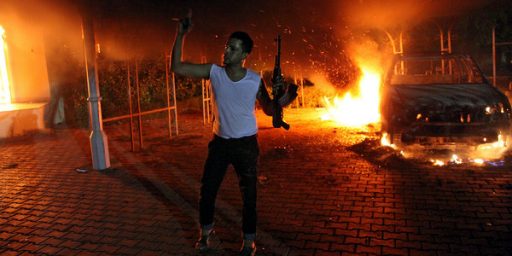Al Qaeda in Iraq Facing Rebellion From Within
Dozens of people who joined or collaborated with al Qaeda in Iraq to fight foreign occupiers are now siding with those occupiers in rebellion against the group’s vicious tactics, the Times of London reports.
Fed up with being part of a group that cuts off a person’s face with piano wire to teach others a lesson, dozens of low-level members of al-Qaeda in Iraq are daring to become informants for the US military in a hostile Baghdad neighbourhood. The ground-breaking move in Doura is part of a wider trend that has started in other al-Qaeda hotspots across the country and in which Sunni insurgent groups and tribal sheikhs have stood together with the coalition against the extremist movement.
[…]
A key factor is that local people and members of al-Qaeda itself have become sickened by the violence and are starting to rebel, Lieutenant-Colonel Michael said. “The people have got to deny them sanctuary and that is exactly what is happening.”
Al-Qaeda informants comprise largely members of the Doura network who found themselves either working with the group after the US-led invasion in March 2003, or signed up to earn extra cash because there were no other jobs going. Disgusted at the attacks and intimidation techniques used on friends, neighbours and even relatives, they are now increasingly looking for a way out, US officers say.
“It is only after al-Qaeda has become truly barbaric and done things like, to teach lessons to people, cut their face off with piano wire in front of their family and then murdered everybody except one child who told the tale afterwards . . . that people realise how much of a mess they are in,” Lieutenant James Danly, 31, who works on military intelligence in Doura, said.
It is impossible to corroborate the claims, but he said that scores of junior al-Qaeda in Iraq members there had become informants since May, including one low-level cell leader who gave vital information after his arrest. “He gave us dates, places and names and who did what,” Lieutenant Danly said. When asked why he was being so forthcoming, the man said: “Because I am sick of it and I hate them, and I am done.”
There were isolated incidents of this sort of thing as early as 2004 and many of us thought they were part of a larger trend that pointed toward the collapse of the insurgency. We were wrong. Still, there have been enough reports in recent months to have hope that AQI is indeed under seige.
That’s good news on a whole variety of levels. Still, even though the relatively small group of jihadists contributes an outsized portion of the violence and energy behind the sectarian fighting in Iraq, no serious analyst thinks that it would end were AQI to be suddenly removed from the equation.
One wonders, too, how steady this trend will be in the face of growing pressure from the public and the halls of Congress to end the American presence. Allying oneself with the American military against a group that is mutilating people with piano wire is a major leap of faith; why would anyone take it knowing that the former may well be gone before the latter are destroyed?





“A key factor is that local people and members of al-Qaeda itself have become sickened by the violence and are starting to rebel”
Why do I have a real hard time buying this???. It would be great news especially if there were some large numbers rebelling….but I just don’t buy it. Why get sick of the violence now???.
I would guess they are sick of the violence within the organization. As long as they’re part of a team fueled by an extreme ideology, everything’s cool. It’s Us against Them.
A few defectors creates paranoia. The trust is gone and the group turns on itself, often incorrectly against loyal members. This in turn creates more disloyalty. People can rationalize all kinds of atrocities until it’s turned (or potentially turned) on them.